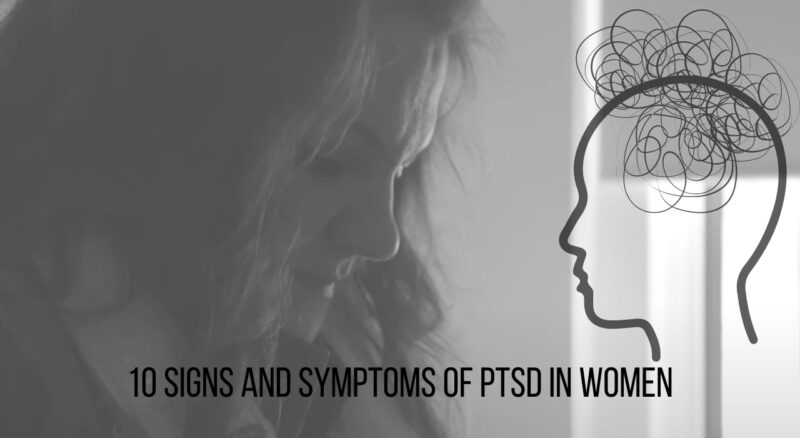In my journey as a mental health professional, I have come across a myriad of disorders that can deeply affect a person’s life. However, few have struck me as profoundly as Post-Traumatic Stress Disorder (PTSD).
I’ve seen how PTSD, often associated with veterans and war survivors, can reach far beyond the battlefield, leaving deep scars on anyone who has weathered a traumatic storm. Over the years, I’ve gained extensive knowledge and experience in identifying PTSD, particularly in women, and I wish to share these insights to foster understanding and prompt crucial conversations about this impactful disorder.
1. Intrusive Thoughts
One of the primary symptoms of PTSD in women is intrusive thoughts about the traumatic event. These can be memories, nightmares, or flashbacks that are incredibly vivid and disruptive. These episodes may occur at any time and may be triggered by something that reminds the woman of the traumatic event.
Even though all individuals with PTSD experience intrusive thoughts, research indicates that women are more likely to report nightmares related to the trauma. These often disturbing dreams can disrupt sleep patterns, leading to chronic fatigue and other health concerns. Additionally, the sense of realism in these dreams or flashbacks can create confusion and intensify fear or distress.
It’s important to note that having occasional memories of unpleasant events is a normal part of life. However, the intensity and frequency of these thoughts in PTSD are typically much higher. This level of persistence and vividness can make it extremely difficult for those with PTSD to lead a normal life.
2. Avoidance Behaviour

Women suffering from PTSD may exhibit avoidance behavior, which can include avoiding places, situations, or people that remind them of the traumatic event. It is a protective mechanism meant to prevent the recurrence of distressing memories or feelings associated with the trauma.
This can lead to a woman drastically changing her lifestyle to prevent these triggers. For example, she may stop engaging in activities she once loved or avoid certain routes to work. In extreme cases, a woman may isolate herself completely to feel safe, which can significantly impact her social and personal life.
While avoidance can sometimes seem like a practical solution, it’s a coping strategy that can often reinforce the trauma rather than alleviate it. It’s essential for individuals exhibiting this behavior to seek professional help to learn healthier coping mechanisms.
3. Negative Changes in Beliefs and Feelings
Negative alterations in cognition and mood are hallmark symptoms of PTSD. A woman with PTSD may experience persistent and distorted blame of self or others, a persistent negative emotional state, diminished interest in activities, or feelings of detachment from others. For example, she may lose interest in activities that she previously enjoyed, or she may start feeling distant from her loved ones.
It’s also common for women with PTSD to have a pervasive sense of doom or to feel that the world is an entirely dangerous place. These symptoms can significantly affect a woman’s overall well-being. As these negative thoughts and feelings take over, they can lead to depression, anxiety, and other mental health concerns, further complicating the process of recovery.
4. Hyperarousal and Reactivity

Hyperarousal, also known as increased emotional reactivity, is another common symptom of PTSD. This can manifest in several ways, such as a heightened startle response, sleep disturbances, irritability, aggressive behavior, or self-destructive behavior.
For instance, a woman with PTSD might find herself easily startled by loud noises or sudden movements. She may have difficulty sleeping, or she may exhibit uncharacteristic outbursts of anger. In severe cases, she might engage in risky or harmful behavior, such as substance abuse or self-harm.
Hyperarousal often leaves individuals in a constant state of ‘fight or flight,’ leading to chronic stress, fatigue, and other health problems. It’s a clear sign that professional help is needed to manage the condition effectively.
5. Difficulty Concentrating
PTSD can lead to cognitive changes, such as difficulty concentrating or remembering things. A woman with PTSD may have trouble focusing on tasks at work or home, which can affect her job performance and personal relationships.
She might also struggle with memory issues, such as forgetting important dates or details of conversations. This is often due to the intrusive thoughts and hyperarousal symptoms of PTSD, which can make it difficult to focus on anything other than the trauma.
6. Physical Symptoms

PTSD is not just a psychological condition – it can also lead to various physical symptoms. Some of the most common ones include headaches, stomachaches, muscle tension, chest pain, and unexplained aches and pains.
These symptoms are often caused by the constant stress and tension that come with PTSD. The body is in a constant state of ‘fight or flight,’ which can wreak havoc on physical health over time. Additionally, the lack of quality sleep many people with PTSD experience can exacerbate these physical symptoms.
7. Emotional Numbing
Some women with PTSD may respond to their trauma by emotionally numbing themselves. They may feel detached from their emotions or struggle to feel positive emotions. This can make them seem cold or uncaring, but it’s actually a coping mechanism designed to protect them from painful memories or feelings.
Emotional numbing can have a significant impact on a woman’s relationships. She may struggle to connect with loved ones or feel unable to experience joy or love. This emotional disconnection can be very distressing for both the woman with PTSD and the people in her life.
8. Guilt and Shame
Guilt and shame are common feelings in women suffering from PTSD. They may feel guilt or shame about the traumatic event itself, or they may feel guilty about their reactions to the event. Some women even blame themselves for the trauma, believing they could have prevented it in some way.
These feelings of guilt and shame can be extremely damaging. They can lead to feelings of worthlessness and despair, which can further exacerbate other PTSD symptoms. In the worst cases, they can even lead to suicidal thoughts.
9. Changes in Self-Perception

Women with PTSD often experience significant changes in how they view themselves. They may see themselves as helpless, damaged, or worthless. This can lead to a significant decrease in self-esteem and a negative self-image.
These changes in self-perception can be incredibly harmful. They can lead to a vicious cycle of negative thinking and self-blame, which can further intensify other PTSD symptoms. They can also lead to depression, anxiety, and other mental health disorders.
10. Increased Anxiety and Panic Attacks
Finally, many women with PTSD experience increased anxiety and panic attacks. They may constantly feel on edge as if they are always waiting for something bad to happen. This can lead to physical symptoms like a rapid heart rate, sweating, and trembling. Panic attacks can be incredibly frightening and overwhelming. T
hey often come on suddenly and can make a woman feel like she is losing control or even dying. If a woman is experiencing frequent panic attacks, it’s a clear sign that she needs professional help. Anxiety and panic attacks can be effectively managed with the right treatment.
Therapies like CBT and exposure therapy, along with certain medications, can significantly reduce the frequency and intensity of these attacks.
Final Thoughts
PTSD is a complex and challenging disorder, but with awareness and professional help, it can be managed effectively. If you or a woman in your life is experiencing any of these symptoms, it’s crucial to seek professional help. Remember, it’s never too late to take the first step toward healing. Your mental health matters.

